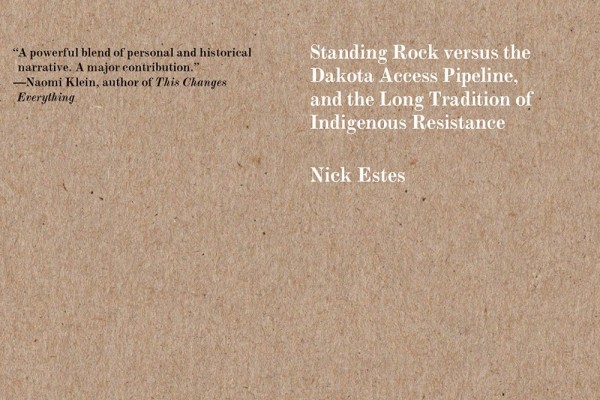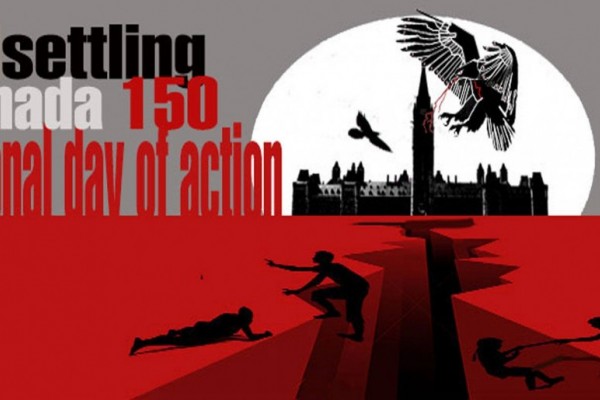Palestine and the Dakota Access Pipeline: Time to globalize BDS

From Pipelined: Photographing the Dakota Access Pipeline Protests video published on YouTube August 19, 2016 by Take5ND.
The current struggle by Indigenous peoples of North America against settler-colonial economic projects is becoming an opportunity for the world to embrace Indigenous rights through the Palestinian BDS movement on a global scale.
The Standing Rock Sioux Tribe is waging a campaign of steadfast resistance against a proposed pipeline project that represents a risk to the Missouri River, which serves as a drinking source for the Indigenous community, as well as threatening the sacred burial grounds that the pipeline will intrude upon. The Dakota Access Pipeline project involves building an oil pipeline that will start in North Dakota and pass through South Dakota and Iowa all the way to Illinois. It was initiated by Dakota Access LLC, a subsidiary of Energy Transfer Crude Oil Company.
As Canadian Dimension readers know, the Boycott, Divestment and Sanctions (BDS) campaign is a Palestinian movement of resistance to Israeli settler-colonialist expansion and corporate complicity with it — a successful strategy learned from the struggle against the South African Apartheid regime whose aims it echoes.
Oil companies and such corporate projects as the Dakota Access Pipeline are encountering growing opposition from Indigenous peoples and their allies who are seeking to defend the right of Indigenous peoples and other communities on the periphery to live healthy and sustainable lives. They are drawing the line on corporate expansionism enabled by corrupt politicians (the Energy Transfer Crude Oil Company appointed former Texas governor Rick Perry to the Board of Directors in spite of his facing two state-level felony charges for abuse of power).
The United Nations supports the BDS movement in a variety of ways, including the blacklisting of corporations operating in the illegal Israeli settlements built on annexed indigenous Palestinian lands. The experience by Indigenous peoples in North America of elected officials and companies infringing their rights with impunity is all too familiar to the Palestinians. In addition to similar historical patterns of settler-colonial expansionism, systemic racism and ethnic cleansing as well as genocidal processes, both past and present, the Palestinians, like the Indigenous peoples of North America, are up against joint corporate and state ventures that violate their rights. In the Palestinian context, these are outlined in the Human Rights Watch report “Occupation Inc.”
Now is the time to turn the BDS campaign into an international Indigenous rights campaign by blacklisting the corporations operating or trying to intrude on Indigenous peoples’ territories in North America. In the Canadian context, the struggle of the Lubicon Cree is a case in point. The Lubicon Cree have resisted state-sponsored oil company development in their territories, waging an ongoing 14-year contest in the courts that was heard by government appointed judges who were the ex-partners of senior oil company lawyers and others who, upon retirement, were appointed to the governing boards of some of the oil companies involved.
Jusilea Charger, 20,
Eagle Butte, South
Dakota, from “Faces
of the North Dakota
pipeline protest,”
by Josué Rivas;
theguardian.com,
August 25, 2016.
Two-pronged problem for Indigenous peoples
The success of the struggle for the rights of Indigenous peoples is threatened by a two-pronged problem — the role of certain co-opted leaders in perpetuating the violations of the settler-colonial state, as well as the impotence and genuine inaction by the United Nations in enforcing the protection of Indigenous peoples’ rights.
A good illustration of the first problem in Canada is the former Assembly of First Nations chief, Phil Fontaine, who accepted an employment opportunity with TransCanada Corp specifically to work on the proposed Energy East pipeline, a decision that was denounced by Indigenous communities fighting Energy East in Canada. In 2006, on a paid visit to Israel courtesy of the Canadian Jewish Congress, Fontaine also voiced support for the settler-colonial state, saying “Indigenous people in Canada have much in common with the people of Israel, including a respect of the land and their languages.” At the time, Canadian Indigenous activist Lee Maracle connected all the dots in a letter she wrote to the AFN, drawing the parallels between Palestine, South Africa and the U.S. and Canada when she commented that the visit “… is tantamount to laying a wreath at Vorster’s grave in the interest of [honouring apartheid] or traveling to the U.S. to share the values of the Custer Committee celebrating the massacre at Wounded Knee.”
The Palestinian Authority is also culpable of corruption, as evidenced by certain members who engage in partnerships with Israeli companies at the expense of their own peoples’ struggle for political and socio-economic self-determination.
And with the recent news of the police and corporate mercenaries in the United States attacking protesters and activists at the Dakota Access Pipeline site with dogs and pepper spray, it is worth noting that this tactic was exported by Israel, where the use of dogs to taunt and terrorize Palestinians is prevalent, as a means to halt protest and activism. Israel’s export of methods of colonial oppression of the Palestinians underscores the commonality of injustice when it comes to Indigenous rights.
The United Nations Declaration on the Rights of Indigenous Peoples clearly protects the Standing Rock Sioux Tribe from the Dakota Access Pipeline Project under Article 32 of the Declaration. Given that the United Nations recently decided to investigate the plight of Native Americans for the first time in history through a human rights inquiry, this is a chance for the world to see the oppression of Indigenous peoples in America as a part and parcel of global pattern of dispossession and repression of Indigenous peoples.
Ahmad Moussa is an international freelance writer, researcher and activist. He holds a graduate degree in international law and human rights.
This article appeared in the Autumn 2016 issue of Canadian Dimension (Leap, the Left & the NDP).










